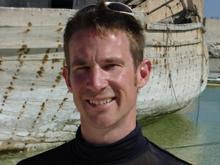Which fish species will we be eating in 2050? What will the climate be like, and what will it mean for the productivity of the oceans? And how can we turn fisheries management around so that we harvest sustainably and ensure the livelihoods of fishing communities in the future?
These are three of the questions a diverse group of academics from the Cabot Institute tackled at the inaugural Cabot Writing Day in January. The concept for the event was that invitees from a range of disciplines (in this case marine biologists, lawyers, earth scientists, geographers and NGO representatives) gathered to address a central theme, and in a day produce a position paper:
2050: Sustainable oceans in a changing climate
As you can see we covered a huge amount of ground, gained valuable insights from each other's disciplines, share personal viewpoints and (deliberately) envisaged a very positive future for fisheries in 2050.
We are now using our discussions to fuel ideas for grant applications, initiate new contact and interaction with industry and policymakers, and potentially develop a TV series.
If you would like help organising a Cabot Writing Day on a subject you think needs attention and which suits the diverse Cabot Institute community, please contact Stephen.Simpson@bristol.ac.uk (Cabot KE Fellow) or Philippa.Bayley@bristol.ac.uk (Cabot Manager) to discuss your ideas...
These are three of the questions a diverse group of academics from the Cabot Institute tackled at the inaugural Cabot Writing Day in January. The concept for the event was that invitees from a range of disciplines (in this case marine biologists, lawyers, earth scientists, geographers and NGO representatives) gathered to address a central theme, and in a day produce a position paper:
2050: Sustainable oceans in a changing climate
As you can see we covered a huge amount of ground, gained valuable insights from each other's disciplines, share personal viewpoints and (deliberately) envisaged a very positive future for fisheries in 2050.
We are now using our discussions to fuel ideas for grant applications, initiate new contact and interaction with industry and policymakers, and potentially develop a TV series.
If you would like help organising a Cabot Writing Day on a subject you think needs attention and which suits the diverse Cabot Institute community, please contact Stephen.Simpson@bristol.ac.uk (Cabot KE Fellow) or Philippa.Bayley@bristol.ac.uk (Cabot Manager) to discuss your ideas...
